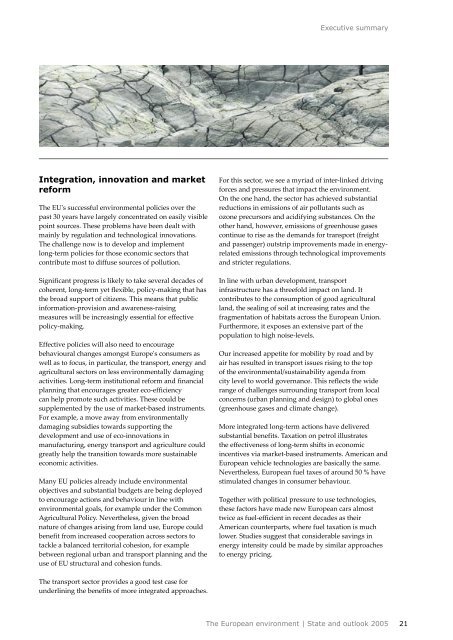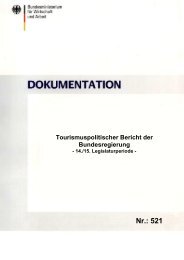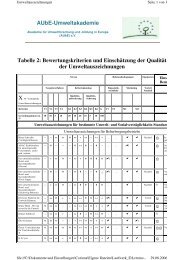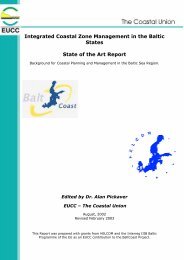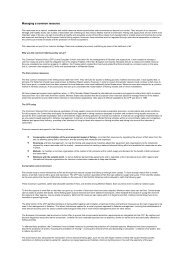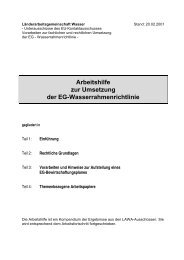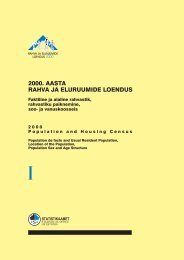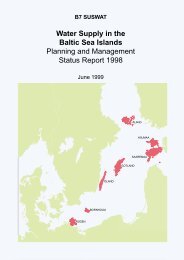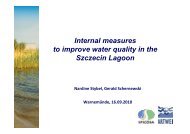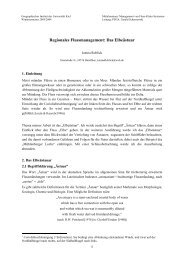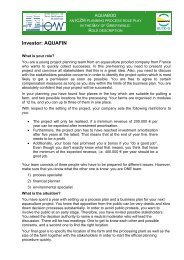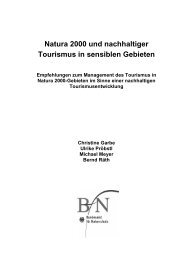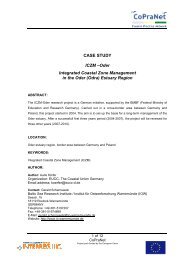The European environment - State and outlook ... - IKZM-D Lernen
The European environment - State and outlook ... - IKZM-D Lernen
The European environment - State and outlook ... - IKZM-D Lernen
You also want an ePaper? Increase the reach of your titles
YUMPU automatically turns print PDFs into web optimized ePapers that Google loves.
Executive summary<br />
Integration, innovation <strong>and</strong> market<br />
reform<br />
<strong>The</strong> EU's successful <strong>environment</strong>al policies over the<br />
past 30 years have largely concentrated on easily visible<br />
point sources. <strong>The</strong>se problems have been dealt with<br />
mainly by regulation <strong>and</strong> technological innovations.<br />
<strong>The</strong> challenge now is to develop <strong>and</strong> implement<br />
long-term policies for those economic sectors that<br />
contribute most to diffuse sources of pollution.<br />
Significant progress is likely to take several decades of<br />
coherent, long-term yet flexible, policy-making that has<br />
the broad support of citizens. This means that public<br />
information-provision <strong>and</strong> awareness-raising<br />
measures will be increasingly essential for effective<br />
policy-making.<br />
Effective policies will also need to encourage<br />
behavioural changes amongst Europe's consumers as<br />
well as to focus, in particular, the transport, energy <strong>and</strong><br />
agricultural sectors on less <strong>environment</strong>ally damaging<br />
activities. Long-term institutional reform <strong>and</strong> financial<br />
planning that encourages greater eco-efficiency<br />
can help promote such activities. <strong>The</strong>se could be<br />
supplemented by the use of market-based instruments.<br />
For example, a move away from <strong>environment</strong>ally<br />
damaging subsidies towards supporting the<br />
development <strong>and</strong> use of eco-innovations in<br />
manufacturing, energy transport <strong>and</strong> agriculture could<br />
greatly help the transition towards more sustainable<br />
economic activities.<br />
Many EU policies already include <strong>environment</strong>al<br />
objectives <strong>and</strong> substantial budgets are being deployed<br />
to encourage actions <strong>and</strong> behaviour in line with<br />
<strong>environment</strong>al goals, for example under the Common<br />
Agricultural Policy. Nevertheless, given the broad<br />
nature of changes arising from l<strong>and</strong> use, Europe could<br />
benefit from increased cooperation across sectors to<br />
tackle a balanced territorial cohesion, for example<br />
between regional urban <strong>and</strong> transport planning <strong>and</strong> the<br />
use of EU structural <strong>and</strong> cohesion funds.<br />
For this sector, we see a myriad of inter-linked driving<br />
forces <strong>and</strong> pressures that impact the <strong>environment</strong>.<br />
On the one h<strong>and</strong>, the sector has achieved substantial<br />
reductions in emissions of air pollutants such as<br />
ozone precursors <strong>and</strong> acidifying substances. On the<br />
other h<strong>and</strong>, however, emissions of greenhouse gases<br />
continue to rise as the dem<strong>and</strong>s for transport (freight<br />
<strong>and</strong> passenger) outstrip improvements made in energyrelated<br />
emissions through technological improvements<br />
<strong>and</strong> stricter regulations.<br />
In line with urban development, transport<br />
infrastructure has a threefold impact on l<strong>and</strong>. It<br />
contributes to the consumption of good agricultural<br />
l<strong>and</strong>, the sealing of soil at increasing rates <strong>and</strong> the<br />
fragmentation of habitats across the <strong>European</strong> Union.<br />
Furthermore, it exposes an extensive part of the<br />
population to high noise-levels.<br />
Our increased appetite for mobility by road <strong>and</strong> by<br />
air has resulted in transport issues rising to the top<br />
of the <strong>environment</strong>al/sustainability agenda from<br />
city level to world governance. This reflects the wide<br />
range of challenges surrounding transport from local<br />
concerns (urban planning <strong>and</strong> design) to global ones<br />
(greenhouse gases <strong>and</strong> climate change).<br />
More integrated long-term actions have delivered<br />
substantial benefits. Taxation on petrol illustrates<br />
the effectiveness of long-term shifts in economic<br />
incentives via market-based instruments. American <strong>and</strong><br />
<strong>European</strong> vehicle technologies are basically the same.<br />
Nevertheless, <strong>European</strong> fuel taxes of around 50 % have<br />
stimulated changes in consumer behaviour.<br />
Together with political pressure to use technologies,<br />
these factors have made new <strong>European</strong> cars almost<br />
twice as fuel-efficient in recent decades as their<br />
American counterparts, where fuel taxation is much<br />
lower. Studies suggest that considerable savings in<br />
energy intensity could be made by similar approaches<br />
to energy pricing.<br />
<strong>The</strong> transport sector provides a good test case for<br />
underlining the benefits of more integrated approaches.<br />
<strong>The</strong> <strong>European</strong> <strong>environment</strong> | <strong>State</strong> <strong>and</strong> <strong>outlook</strong> 2005<br />
21


